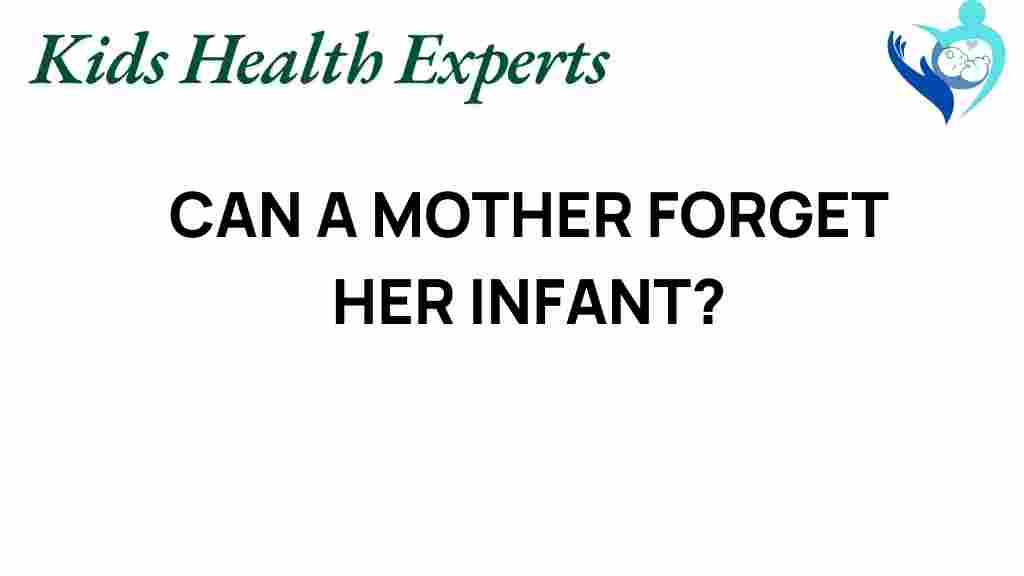The Unthinkable: Can a Mother Truly Forget Her Infant?
The bond between a mother and her infant is often described as one of the strongest emotional connections in human experience. This profound relationship, known as the maternal bond, is critical for child development, influencing not only the infant’s emotional health but also their ability to form attachments in the future. However, the question arises: can a mother truly forget her infant? This article delves into the complexities of maternal memory and attachment, exploring the psychological aspects of motherhood, postpartum challenges, and the nature of maternal instincts.
Understanding the Maternal Bond
The maternal bond is a unique connection that forms between a mother and her child, characterized by love, care, and nurturing. This bond is essential for the infant’s survival and development. Here are key aspects of the maternal bond:
- Emotional connection: The maternal bond fosters a deep emotional attachment that influences the child’s sense of security.
- Biological instincts: Maternal instincts often drive mothers to care for their infants, ensuring their well-being.
- Impact on development: A strong maternal bond is correlated with positive outcomes in childhood development, including emotional health and social skills.
Psychology plays a significant role in how these bonds are formed and maintained. Research indicates that the experiences a mother goes through during pregnancy and postpartum can greatly influence her ability to bond with her child.
The Role of Memory in Motherhood
Memory is a crucial element in nurturing the maternal bond. A mother’s recollection of her infant’s early days shapes her caregiving approach. However, various factors can affect these memories:
- Postpartum depression: This condition can impair a mother’s ability to form memories and can even hinder her connection with her infant.
- Stress and anxiety: High levels of stress can cloud a mother’s memory, making it difficult to recall important moments.
- Sleep deprivation: New mothers often face sleep deprivation, which can significantly impact cognitive functions, including memory.
These factors may lead some mothers to experience feelings of detachment or forgetfulness regarding their infant, raising the question of whether such forgetfulness is a reality or merely a misconception.
The Impact of Postpartum Challenges
Postpartum challenges can disrupt the maternal bond and affect a mother’s emotional health. Understanding these challenges is vital for recognizing how they may lead to feelings of forgetfulness or disconnection:
- Physical recovery: The postpartum period involves physical healing after childbirth, which can be exhausting and distracting.
- Emotional fluctuations: Hormonal changes can lead to mood swings, impacting a mother’s ability to bond with her infant.
- Support systems: Lack of support from partners or family can exacerbate feelings of isolation and forgetfulness.
Step-by-Step Process to Strengthen Maternal Bonding
To foster a strong maternal bond and enhance memory, mothers can engage in specific practices:
- Skin-to-skin contact: Holding your infant close can strengthen the emotional connection and improve memory retention.
- Engaging in eye contact: Eye contact during feeding or playtime helps establish a deeper bond.
- Routine caregiving: Establishing a daily routine can help create consistency and familiarity, enhancing both memory and attachment.
- Sharing experiences: Talking with other mothers can provide emotional support and shared experiences that reinforce the maternal bond.
- Mindfulness practices: Techniques such as meditation can help mothers focus on the present, improving emotional health and memory.
By actively engaging in these practices, mothers can combat feelings of forgetfulness and strengthen their connection with their infants.
Common Myths About Maternal Forgetfulness
There are several myths regarding a mother’s ability to forget her infant, which can lead to misunderstanding and stigma:
- Myth 1: Mothers who forget their infants do not love them.
- Myth 2: Forgetting is a sign of poor parenting.
- Myth 3: Maternal forgetfulness is always permanent.
It is essential to debunk these myths to foster understanding and compassion towards mothers experiencing challenges in their postpartum journey.
Troubleshooting Tips for Mothers Experiencing Forgetfulness
If a mother is feeling disconnected or forgetful, here are some troubleshooting tips to help her reconnect with her infant:
- Seek professional help: Consulting a therapist or counselor can provide support and coping strategies for postpartum challenges.
- Join support groups: Engaging with other mothers can help normalize experiences and reduce feelings of isolation.
- Practice self-care: Taking time for oneself is critical for emotional health, allowing mothers to recharge and reconnect.
- Document experiences: Keeping a journal of daily interactions can enhance memory and strengthen the bond with the infant.
These tips can empower mothers to reclaim their connection with their infants and mitigate feelings of forgetfulness.
The Importance of Emotional Health in Caregiving
Emotional health is paramount in effective caregiving. When mothers prioritize their emotional well-being, they are better equipped to nurture their infants. Here are some reasons why emotional health is crucial:
- Better bonding: Emotionally healthy mothers are more likely to engage positively with their infants, fostering a secure attachment.
- Improved memory retention: Positive emotional states enhance cognitive functions, including memory, facilitating better caregiving.
- Resilience: Emotionally healthy mothers are more resilient in the face of challenges, allowing for sustained caregiving and attachment.
Conclusion: The Resilience of Maternal Instincts
In conclusion, while the notion of a mother forgetting her infant may seem unthinkable, the realities of postpartum challenges can lead to temporary forgetfulness or emotional detachment. However, understanding the maternal bond, the role of memory, and the importance of emotional health is crucial for supporting mothers in their journey.
By addressing postpartum challenges, engaging in bonding practices, and prioritizing emotional health, mothers can strengthen their connection with their infants and navigate the complexities of motherhood. The maternal instinct is resilient, and with the right support and strategies, mothers can flourish in their caregiving roles, fostering lasting relationships with their children.
For more resources on maternal health and support, visit this link. Additionally, if you’re interested in further reading on child development and emotional health, check out this external resource.
This article is in the category Mental and created by KidsHealthExperts Team
